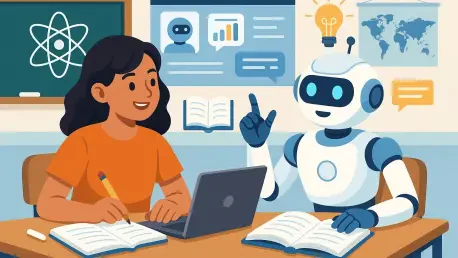Amid growing challenges within the educational sector, artificial intelligence (AI) emerges as a beacon of transformative potential capable of reshaping traditional methodologies. Facing issues like teacher shortages and increased administrative burdens, schools are beginning to explore AI technology to alleviate these pressures and streamline various operations. As discussions unfold around the ethical and technical implications of AI, the drive to optimize education using advanced technologies becomes increasingly relevant.
Examination of AI Technology Features in Schools
Administrative Automation via AI
AI technology unfolds as a crucial tool in reshaping administrative tasks within educational institutions. By automating routine tasks such as scheduling, communication with parents, and grading, AI allows educators to redirect their focus toward more essential teaching responsibilities. This shift not only decreases working hours spent on mundane activities but also reduces burnout rates among teaching staff, fostering a healthier work environment. The deployment of AI in these areas is a logical step toward efficient administrative processes, enabling institutions to operate more smoothly.
Personalized Learning Experiences through AI
Another significant feature of AI in education is its ability to personalize learning experiences for students. Using sophisticated algorithms, AI can tailor educational materials according to individual learning styles and abilities, ensuring each student receives the most effective support. This personal approach enhances learning outcomes and makes education more inclusive, as students who may struggle with conventional methods can benefit from customized programs. This innovative facet of AI technology represents a significant advancement toward student-centric education models that prioritize individual needs over traditional methods.
Innovations in AI Influence Educational Practices
Recent developments underscore the growing influence of AI on educational practices. Cutting-edge advancements in machine learning are enabling adaptive learning systems to evolve, offering students responsive and interactive learning environments. AI’s role in analyzing student data to optimize learning experiences encapsulates these advancements, promising future educational landscapes where adaptability and personalized learning become commonplace. These innovations reflect a trend toward dynamic educational frameworks that react in real-time to emerging information, providing educators with essential tools to enhance teaching methodologies.
Realized Implementation of AI in School Systems
As schools increasingly integrate AI into their framework, several notable implementations emerge. Virtual tutors have been deployed in some institutions, providing students with continuous support and alleviating the pressure on teachers to cater to large classes. Learning analytics empowered by AI are also changing how student progress and performance are monitored, offering educators deeper insights. Case studies reveal that when AI is appropriately applied, it brings tangible improvements in teaching efficiency and student success rates, showcasing its undeniable impact on modern educational settings.
Obstacles and Ethical Considerations
While AI offers promising benefits, it is not devoid of challenges and ethical considerations. Data privacy remains a significant concern, as sensitive student information must be safeguarded against unauthorized access. Schools face technical challenges in seamlessly integrating AI within existing systems, requiring considerable resources and training. Policy and regulation aspects are shaping ongoing efforts to manage these issues, ensuring AI can be harnessed effectively without compromising ethical standards or educational values.
Anticipated Trajectory of AI in Education
Looking ahead, AI technology is poised to bring further advancements to the educational sector. Its potential to revolutionize methodologies and enhance accessibility could lead to unparalleled improvements in teaching and learning processes globally. Speculations abound regarding increased AI capabilities that could refine educational tools, making them more efficient and universally applicable. The continued evolution of AI presents educators and policymakers with the opportunity to redefine paradigms, ensuring education remains inclusive and responsive in this digital age.
Reflecting on AI’s Educational Advancement
The review of AI’s integration in the educational sector reveals how this technology has shifted the operational dynamics within schools. Where administrative burdens once impeded educators, AI is now offering solutions that pave the way for enhanced teaching and learning environments. While its integration serves as a partial remedy to existing challenges, the necessity for addressing pervasive issues of underfunding persists. As AI’s capabilities continue to develop, attention must remain focused on resolving systemic problems to capitalize fully on the technology’s potential. AI’s journey within education embodies both promise and complexity, urging stakeholders to navigate these evolving pathways with informed diligence.









